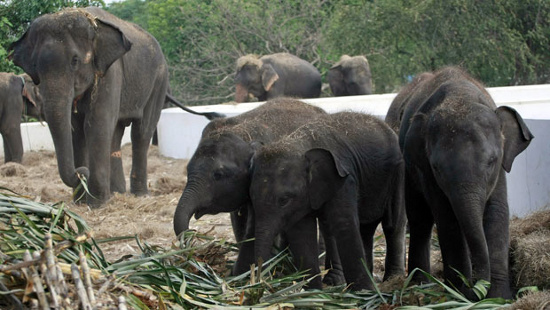Thailand is a country with large illegal trade in ivory
Southeast Asia is one of the countries that consistently failed to deal with the widespread trade in ivory, despite CITES regulations prohibiting trade in ivory.
>>> Thekilling of African elephants is out of control
International Conservation Organization (WWF) and Wildlife Conservation Organization (TRAFFIC) are calling on the government of 177 member countries of the International Convention on the trade of endangered wildlife and plants. (CITES) concentrated in Bangkok, Thailand early next month. The purpose of this is to begin implementing formal procedures for applying trade restrictions to the country that most seriously violates illegal trade in ivory.
The announcement released on February 25 by WWF showed that Thailand, Nigeria and the Democratic Republic of Congo (DRC) repeatedly failed to deal with the widespread trade in ivory in the country, despite the ban. CITES trade in ivory. This regulation is more effective than not regulating the country's ban on ivory selling. Under the treaty, CITES member states may suggest that the parties stop trading 35,000 animal species listed in the convention, from timber to crocodile skin to non-compliant countries.

Elephants eat sugarcane on a farm in Ayutthaya province in central Thailand. (Photo: AP)
Mr. Steven Broad, TRAFFIC Managing Director, said that in all the analysis of ivory trade over the past decade, these are the most relevant countries in the illegal trade in ivory."Increasing demand for ivory makes poaching more prevalent, so CITES member states need to demand strict adherence to international law," Steven Broad said.
The host of this CITES conference is Thailand, one of the world's largest regulated ivory markets. Here, criminals taking advantage of Thai law allow the sale of domestic ivory to mix large quantities of illegal ivory from Africa through shops in Thailand. Most of this ivory is bought by foreign tourists.
According to Carlos Drews, Director of WWF's Global Species Program, Thailand can easily overcome this situation by banning all ivory business in the country and thus will not be necessary. impose trade sanctions.
WWF is petitioning the Thai Prime Minister to issue an immediate ban on ivory trade. Nearly 400,000 people in Thailand and around the world participated in the call with the desire to bring a better future for wild elephants.
According to Drews, in many parts of Africa, elephants are gradually disappearing due to the trade of ivory beyond control. Each country signing the CITES is responsible for protecting elephants by requiring member governments to take responsibility for their involvement with this destructive trafficking.
In addition, WWF and TRAFFIC said that a number of national measures could be used to address elephant poaching, including the establishment of a mechanism to monitor global ivory stockpiles and registration requirements. mandatory for large-scale ivory arrests, regular forensic examinations and adherence to investigative collaborations of functional forces across continents.
According to Mr. Broad, important information about large-scale ivory arrests is missing or unresolved.
"Investigating who is behind each shipment, how to get it to transport, or who benefits from incoming shipments is unknown and interfering. So it is not surprising. is the smuggling of ivory that is increasing to an alarming level, " Mr. Broad said.
- Thailand will strengthen elephant protection
- Kenya confiscated two tons of ivory
- Elephant met with art because of ivory advertising on Google
- African elephants will decline by a fifth in the next 10 years
- Elephants are extinct?
- Join hands to protect wild animals
- Africa suffered, helplessly watching the 1/3 of its elephants in the last 7 years
- The precious horned bird is more than ivory
- African elephants lose their ivory genes to avoid extinction
- African elephants are threatened
- Tigers find both heaven and hell in India
- Thousands of tigers lost their lives in 10 years
 Animal 'suffering' after hibernation
Animal 'suffering' after hibernation Why do goats climb well?
Why do goats climb well? Scientists were surprised to see chimpanzees eating turtles
Scientists were surprised to see chimpanzees eating turtles Giant catfish died deadly due to drought in Thailand
Giant catfish died deadly due to drought in Thailand